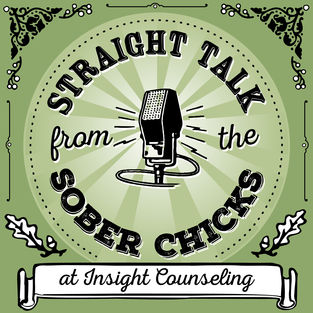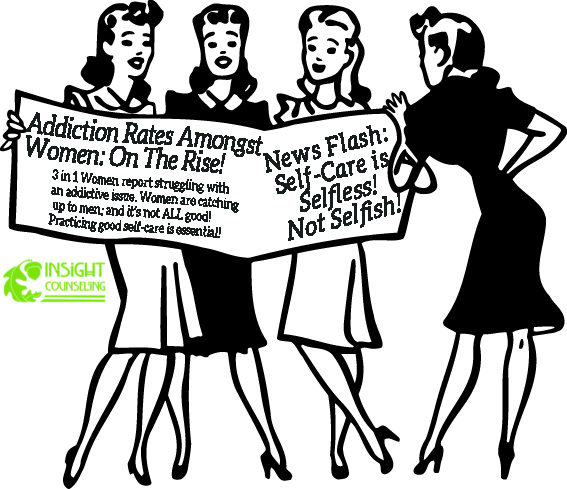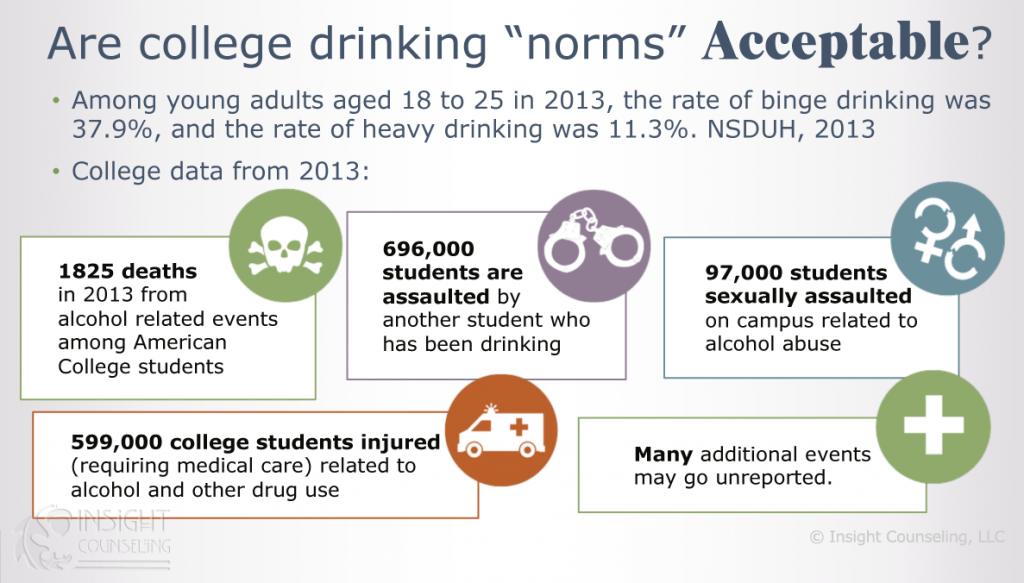
Straight Talk from the Sober Chicks from Insight Counseling
Liz Jorgensen & Sarah Allen Benton of Insight Counseling
Elizabeth Jorgensen and Sarah Allen Benton are two sober chicks, both licensed therapist, who offer advice through humor while discussing addiction, mental health, family therapy, parenting issues and relevant current events!
- 15 minutes 7 secondsThe Sober Chicks: E10 "Women & Recovery"
“Women & Recovery:” The Social & Personal Barriers Women Face When Seeking Treatment
In this episode of Straight Talk, the Sober Chicks discuss some of the barriers women face when seeking treatment for their struggles with addiction. We discuss some of the personal shame that women feel when admitting they have an addictive issue and some of the social constructs that often prevent or delay women from getting the treatment they need. In this episode, you’ll learn some of the risk factors for women and just how powerful it can be when women come together to support each other in treatment. Women are finally catching up to man in many respects, unfortunately, one of those things happens to be in the rates of reported addictive disorders.
 Women face both external & internal barriers when it comes to seeking treatment; including social & personal shame.
Women face both external & internal barriers when it comes to seeking treatment; including social & personal shame.
Struggles with Self-Shame & Societal Shame:
Many women struggle with self-shaming tendencies when it comes to seeking treatment or even acknowledging they have a problem. We’ve heard from clients who say they feel an obligation to bear the burden of their familial responsibilities and would feel ashamed and weak if they had to take time for themselves to seek treatment. Many women are in caregiving roles and feel guilty over the thought of possibly taking time away from their families to go to treatment or even acknowledge they might be struggling with maintaining a healthy lifestyle. The same type of sentiment exists with professional women who feel like they have worked too hard to overcome barriers in the workplace, that taking the time to seek treatment would set them back. The guilt expressed by many female patients tends to be linked the sentiment that women “aren’t allowed” to take time away from their family or job. Many of our male clients don’t struggle as frequently with these issues; socially it seems more acceptable for a man to express that he is struggling with an addictive issue than a woman.
The Telescoping Phenomenon
Many women have also fallen prone to what is known as the “telescoping phenomenon.” This term describes the relatively short term progression from substance use to substance dependence or abuse. In many cases, we see women, often starting in their 30’s, experience a dramatic life change; whether it be divorce or empty nest syndrome, they go from using a substance to abusing the substance. In the past women have had lower rates of addictive behavior, in recent years women are unfortunately catching up to men in this regard. More women are seeking treatment for addiction issues and quite often the telescoping phenomena is reported. Here is a great study that explores some of the most recent statistics and observations: Substance Abuse in Women
Single-Sex Therapeutic Environment
An all female environment has proven to be an excellent form of treatment for women dealing with any mental health issue, particularly addiction
 Women support & challenge one another best when in a single-sex environment.
Women support & challenge one another best when in a single-sex environment.
treatment. Here at Insight Counseling, we offer a women’s support group and have observed in our own sessions the powerful change that comes with an all female environment. Women tend to offer one another care and support and challenge one another in ways we don’t often see from their male counterparts. For more information or to register for our Women’s Recovery Group, please contact our Office Manager at (203) 431-9726 ext. 0.
Self-Care Isn’t Something to Feel Guilty About
Women often sacrifice self-care; even women that aren’t faced with an addictive disorder often sacrifice their own well being for the happiness of others. It’s a social construction that women are the main caregivers and family/work obligations come first. Many women experience anxiety or guilt over taking time for themselves. In our own observations sometimes having an addiction disorder that demands
 treatment is a welcomed reprieve from daily obligations; many women feel almost grateful to have an “excuse” for taking care of themselves. The lack of self-care and the sacrifice that so many women make for the happiness of others can often lead to the development of an addiction disorder and other mental health issues. If more women realized that self-care is the least selfish thing one can do, then we would all be happier and healthier! The best thing for you to do is to take care of yourself so you can care for others; it’s not selfish, it’s selfless!
treatment is a welcomed reprieve from daily obligations; many women feel almost grateful to have an “excuse” for taking care of themselves. The lack of self-care and the sacrifice that so many women make for the happiness of others can often lead to the development of an addiction disorder and other mental health issues. If more women realized that self-care is the least selfish thing one can do, then we would all be happier and healthier! The best thing for you to do is to take care of yourself so you can care for others; it’s not selfish, it’s selfless!Remember to take your sobriety seriously, but not yourselves too seriously!
– The Sober Chicks, Liz & Sarah
If you, or someone you know, is struggling with addiction or any other mental health issue please feel free to contact us. Insight Counseling is located in Ridgefield, CT, we have a great team of mental health professionals that can help. Contact us through email at info@insightcounselingllc.com, or call: 203-431-9726.
15 October 2015, 5:57 am - 26 minutes 15 secondsThe Sober Chicks: E09, "Fool's Rules"
The Sober Chick’s Favorite “Fool’s Rules”
In this episode, the Sober Chicks discuss some of the “fools rules” that addicts use to justify their behavior. We humorously breakdown the thinking behind those justifications, lay out why it can be so destructive and share examples of these “rules”, many from our own personal experiences. We talk about how as clinicians we work to deconstruct that mode of thinking with our clients and how we even changed our own addictive thinking.
The Most Commonly Used “Rules”

- Liz’s classic, “Winston Churchill drank every day during WWII… And he defeated the Nazis!”
- I don’t drink in the morning… Therefore I’m not an alcoholic.
- I’m drinking by choice, not because I have to!
- I only binge on the weekends, I don’t drink during the week. (Maintenance vs Binge Drinkers)
- I don’t get drunk every time!
- All my friends drink, so it’s normal!
- I only drink certain types of alcohol. I’m a connoisseur of fine wines/craft beers!
- I’m only affecting myself, not loved ones.
- I still ________ (Fill in the blank, ex: get good grades, succeed in the workplace, show up on time), therefore I don’t have a problem.
The “Stereotypes”
 The Stereotype is not always accurate!
The Stereotype is not always accurate!
Many of the rules we hear from individuals struggling with addiction are based off social constructions of what an addict “looks like.” The idea that
you’re only an alcoholic if you don’t show up to work, or drink in the morning, is a dangerous misconception. Many patients with addictive disorders justify their behavior because it doesn’t look like the stereotypical image of how addiction is “supposed” to look. Many people that are binge drinkers, drinking only on the weekends, don’t realize that they have an addictive disorder because they aren’t maintenance drinkers. That makes it even more difficult to recognize that there is an problem and seek treatment for it.
The Social Justification
 Rule # 6: All my friends drink, so it’s normal!
Rule # 6: All my friends drink, so it’s normal!
Between the ages of 18 – 24 tends to be the heaviest drinking period for most young adults, however many adults phase out of that and stop these unhealthy drinking habits. Many individuals struggling with addiction use the fact that many of their friends are drinking/smoking as heavily as they are, as a means to justify their behavior. It is only recognized as a problem when the friends that used to justify the addictive behavior stop partying and the individual that has been struggling with addiction is left as the outlier.
The Connoisseur
With wine tastings and craft beers all the rage these days, we are seeing more clients who use their love of fine wines and craft beers as a justification for their substance dependence. Some people do have the
 Rule # 7: I only drink certain types of alcohol. I’m a connoisseur of fine wines/craft beers!
Rule # 7: I only drink certain types of alcohol. I’m a connoisseur of fine wines/craft beers!
ability to enjoy alcohol for the taste and not abuse it, often those that are prone to abusing the substance use, label themselves as connoisseurs or collectors to mask their dependence issue. The person that can’t handle when people “spit” at wine tastings (because that would be a waste of a good sip of wine!) might have a problem.
For more on this issue, Sober Chick, Sarah Allen Benton published an article on Psychology Today, check out her blog post here: https://www.psychologytoday.com/blog/the-high-functioning-alcoholic/201510/fools-rules-justifying-drinking
Remember to take your sobriety seriously, but not yourselves too seriously!
– The Sober Chicks, Liz & Sarah
Here are some great statistics on binge & social drinking:

If you, or someone you know, is struggling with addiction or any other mental health issue please feel free to contact us. Insight Counseling is located in Ridgefield, CT, we have a great team of mental health professionals that can help. Contact us through email at info@insightcounselingllc.com, or call: 203-431-9726.
13 October 2015, 7:14 pm - 13 minutes 53 secondsThe Sober Chicks: E08: “I’m Too Smart for Therapy”
The Sober Chicks Explain, Why You Might Be “Too Smart” For Therapy
Get ready to hear the Sober Chicks break it down in an impromptu hip-hop session! Riffing off Right Said Fred’s, “I’m Too Sexy,” we created our own version, “I’m Too Smart…For Therapy!” We wanted to find a way to humorously share some of the challenges high-functioning addicts face when it comes to getting the treatment they need. In this episode of, “Straight Talk from the Sober Chicks,” we discuss how the same traits that make it harder for high-functioning individuals struggling with addiction, also make it harder to get sober.
The Traits That Make You Successful, Make it Hard to Get Sober
Often, the very trait make an individual successful in life, make it even more of a challenge for them to succeed in achieving sobriety. High-functioning patients are often individuals that have seen great success in their professional lives, often it is their high level of intellect that get in the way of their sobriety. Both Sarah and I have heard from patients who dismiss proposed treatment options saying they won’t work for them; this perspective is is often a reactionary and defensive one, that gets in the way of a achieving sobriety and maintaining a healthy & balanced lifestyle.
It’s Not Personal
Many people find it difficult to separate their struggles with addiction from their own personal success. It is hard to admit that you may have a substance abuse problem and even harder when it means accepting there are flaws in your decision making process. Often clients that take feedback as personal criticism, when it is not! Accepting that you have an addictive disorder is difficult; but working to overcome the mental roadblocks that often get in the way of staying sober is even more challenging. As therapists and as individuals in recovery, we fully understand what a hurdle this is for our clients and work to help patients re-work their thinking and slowly break down those roadblocks, one piece at a time!
A Simple Program for Complicated People
When I first started in AA, this was a concept that was commonly reinforced. Often clients dismiss 12-Step Programs because of the simplistic approach to recovery; but for any patient, even high functioning ones, the simplicity is what makes it effective. High-functioning people struggling with addiction are often in a high-stress, high-pressure work environment, which can further additive tendencies, compounded with family responsibilities, there is pressure to “do it all,” and do it well. That is what makes the 12-Step approach an important facet of recovery; everything else is complicated and this form of treatment is straightforward.
Let’s face it, you’ve got enough going on, so keep it simple!
Remember to take your sobriety seriously, but not yourselves too seriously!
– The Sober Chicks, Liz & Sarah
If you, or someone you know, is struggling with addiction or any other mental health issue please feel free to contact us. Insight Counseling is located in Ridgefield, CT, we have a great team of mental health professionals that can help. Contact us through email at info@insightcounselingllc.com, or call: 203-431-9726.
Have a Question for the Sober Chicks? Want a straight answer from Liz or Sarah? Send us your question or topic you want us to discuss and we might feature it on one of our upcoming episodes of “Straight Talk from the Sober Chicks.”
5 October 2015, 9:56 am - 15 minutes 15 secondsThe Sober Chicks: E07 "Take My Advice, I'm Not Using It, Part 2 feat. Charles Bentz"
The Importance of Self-Care for the Caregiver
This episode of “Straight Talk from the Sober Chicks” in this two part series, features Charlie Bentz Owner/CFO of Luxury Extended Care & Transitional Living and Malibu Beach Sober Living. Charlie and the Sober Chicks discuss the importance of self-care for the caregiver. Charlie shares his own personal story of recovery and rebirth of empathy when he was in treatment and witnessed the 9/11 attack on the World Trade Center. Working on Wall Street at the time, he shares how he witnessed those working in the treatment facility worked to keep their composure as they showed their patients care. Liz, Sarah & Charlie discuss how it can be difficult for those giving care to make time for self-care and some great tips for taking care of yourself.
If you need a professional to assist you with finding the best option for your path to happiness and healthiness, you can contact Insight Counseling through email at info@insightcounselingllc.com, or call: 203-431-9726.
Remember to take your sobriety seriously, but not yourselves too seriously!
– The Sober Chicks, Liz & Sarah
Have a Question for the Sober Chicks? Want a straight answer from Liz or Sarah? Send us your question or topic you want us to discuss and we might feature it on one of our upcoming episodes of “Straight Talk from the Sober Chicks.”
2 October 2015, 5:34 pm - 14 minutes 36 secondsSelf-Care for the Care Giver: Take My Advice, I'm Not Using It, Part 1
Self-Care for the Care Giver: Take My Advice, I’m Not Using It, Part 1
The Sober Chicks attended the Cape Cod Symposium on Addictive Disorders this month and while there we figured it was a great place for us to record a couple of podcast episodes focusing on the importance of self-care for the caregiver. Let’s face it, as clinicians we are great at giving advice but not always as good at applying to ourselves. In the first episode in this two part series, titled, “Take My Advice, I’m Not Using It” we had the privilege to interview our friend and colleague, Alan Budd, Program Director of the Dentist Health and Wellness Committee of the Massachusetts Dental Society.
Alan & The Sober Chicks discuss some of the risk factors for professionals in the medical and mental health field and breakdown some of the reasons why those in the field of dentistry are sometimes at higher risk for addictive disorders. Dentists, more so than other healthcare professionals, tend to establish private practices; which can be an isolating experience, compounded with the financial burden they take on to start their business. Check out this episode of Straight Talk for some tips on how professionals can seek help if they are struggling with addiction and some of the key factors that contribute to addictive disorders in the dentistry and other medical professions.
For more on the Dental Health and Wellness Committee, check out their website here: www.dhwcma.org
If you need a professional to assist you with finding the best treatment option for an addictive disorder or any other mental health professional, and you live in Connecticut, you can contact Insight Counseling through email at info@insightcounselingllc.com, or call: 203-431-9726.
Remember to take your sobriety seriously, but not yourselves too seriously!
– The Sober Chicks, Liz & Sarah
Have a Question for the Sober Chicks? Want a straight answer from Liz or Sarah? Send us your question or topic you want us to discuss and we might feature it on one of our upcoming episodes of “Straight Talk from the Sober Chicks.”
30 September 2015, 2:00 am - 15 minutes 31 secondsE05: "Take What You Like & Leave the Rest, The Buffet Style Approach to Addiction Treatment"
Take What You Like & Leave the Rest:
The Buffet Style Approach to Addiction Treatment
Everyone loves a good buffet; you have a wealth of options to choose from, but only you get to decide what appeals to your appetite most. Whether it’s chicken cordon bleu (which Liz has an excellent recipe for, if you’re interested, just ask!), lasagna or roast beef and mashed potatoes, there is something for everyone and sometimes it’s roast beef and lasagna! In this episode of Straight Talk, the Sober Chicks break down why sometimes lasagna all day everyday might not work for everyone and how you can choose what works for you!
“The Buffet” Approach
There isn’t one approach to addiction treatment that works for every person in recovery; sometimes it’s about finding what works for you and sticking with it and more often it’s about finding several treatment options that suit you best. Fundamentalism is in addiction treatment field can be dangerous and can deter many individuals from getting help. Treatment and the healing process is very personal and no one solution is a right fit for every person.
12-Step Programs
12-Step programs like, Alcoholics Anonymous are often misunderstood to be an extremist approach to addiction treatment. In fact, AA Literature states that if you have outside issues, to seek treatment for those issues. 12-Step Programs offer an important level of peer support and can be an important part of an individual’s path to sobriety. What concerns us Sober Chicks is when it becomes the “ONLY” way to get sober. We have both seen, firsthand, program members, therapist and other treatment providers express fundamentalist and extremist views surrounding the 12-Step Programs. While they might mean well, sometimes it results in deterring someone who is seeking help away, because they feel the approach might not be the best path to recovery. 12-Step Programs are incredibly valuable in helping people live a sober life, but more often than not, they are just one part of a treatment plan that helps you find balance and sobriety.
If you live locally you are welcome to check out Insights Peer Support Groups. For more information check out our available Programs: https://insightcounselingllc.com/?page_id=377
For more information on AA or to review the program literature, visit their website at: http://www.aa.org/
The Effectiveness of Treatment Teams
Having more than one cook in the kitchen can be very helpful when it comes to determining the right treatment for an individual. The ability for your doctor, therapist and other specialist to consult with one another is a great step in finding the treatment plan that’s a right fit for you. Sometimes having a second option can ensure that you are on the path to sobriety. We’ve heard from clients here at Insight Counseling that have struggled for years with their sobriety, often questioning why 12-Step Programs weren’t enough and after seeking our help, discovered an underlying issue keeping them from enjoying a healthy, balanced, sober life. Sometimes that means a treatment plan that includes peer support from 12-Steps groups combined with meditation or yoga and meditation.
Avoid The Extremes:
No matter what form of treatment you pursue, just remember that too much of one thing is never a good thing! Addiction is about extremes whereas healing and recovery is about finding balance.
How Do I Know What’s Right For Me?
Just like you would at a buffet, GO WITH YOUR GUT! If something doesn’t fit right with you, explore other options, mix and match. If you don’t find the option that works for you then sobriety will be hard to come by. Remember, healing and recovery is a very personal process so find the balance for what’s right for you!
Want more? Check out Sober Chick, Sarah Allen Benton’s blog post on Psychology Today: https://www.psychologytoday.com/blog/the-high-functioning-alcoholic/201509/not-just-one-way-get-sober
If you need a professional to assist you with finding the best option for your path to happiness and healthiness, you can contact Insight Counseling through email at info@insightcounselingllc.com, or call: 203-431-9726.
Remember to take your sobriety seriously, but not yourselves too seriously!
– The Sober Chicks, Liz & Sarah
Have a Question for the Sober Chicks? Want a straight answer from Liz or Sarah? Send us your question or topic you want us to discuss and we might feature it on one of our upcoming episodes of “Straight Talk from the Sober Chicks.”
29 September 2015, 7:09 am - 16 minutes 44 secondsSTSC E04: "Weed Fundamentalism, Part 2"
Dealing with Your Weed Fundamentalist: 3 Need To Know Tips for Parents
Earlier this month on “Straight Talk from the Sober Chicks at Insight Counseling”, we introduced you to the new phenomenon we are calling, “Weed Fundamentalism.” The new “religion” we have seen take hold amongst many of the teenagers we meet in treatment. In part one of this ongoing series we discussed key narratives we hear expressed by those that view marijuana as an infallible plant, a gift from god, with no negative impacts on their growing brains. Check out our breakdown of the issue and some real sobering facts about the impact of marijuana use: 5 Signs That Might Mean You’re a “Weed Fundamentalist”
This week the Sober Chicks, Liz Driscoll Jorgensen & Sarah Allen Benton breakdown for parents some hard facts they can share with their teens about the impact and repercussions of marijuana use and we offer three useful pieces of advice for how to best deal with the weed fundamentalist in your household!
In my personal opinion, the decriminalization of marijuana is a good thing in that it no longer sends people to jail for something as small as marijuana use. It saves every taxpayers money when we don’t lock people up for smoking a joint; people are better served going to treatment as opposed to serving jail time and living with a criminal record. However, with it’s decriminalization in many states and legalization in others, the Sober Chicks think it might be time for a public health campaign that sheds light on some of the dangers of regular marijuana use.
Many of our clients are minors and we have had more than one get in trouble with the law over their marijuana usage. These teens and many others have expressed a clear misinterpretation of the law. Our practice, Insight Counseling, LLC is located in Connecticut where marijuana use is decriminalized. Many teens we have worked with fail to understand even the difference between legalization and decriminalization and how it applies to them as minors. One client pulled over by police after smoking pot proceeded to argue that it wasn’t a crime for him to use marijuana, to which the officer explained that yes it was because they were under 21.
Public health campaigns have done a great job at informing young people about the dangers of other legal, but dangerous substances such as alcohol and tobacco. Clients who are expressed “Weed Fundamentalist” have shared with us a clear understanding of the dangers of both alcohol and tobacco, but clearly believe that marijuana is a benign, if not beneficial, substance!
Parents often struggle with their teens in this battle to make kids understand that smoking pot isn’t as safe as they think it is. Here are three pieces of advice for dealing with a stubborn teen, hellbent on smoking pot:
Dealing with Your Weed Fundamentalist: 3 Tips for Parents

- Tell Your Weed Fundamentalist Smoking Weed is a Safety Issue
- Science proves marijuana use is detrimental to a developing brain. Smoking even a couple times a month before the age of 25 can reduce IQ!
- Marijuana use reduces reaction time up to 10 hours after use! If your teen is driving then that is a safety issue.
- As Parents You Have LEVERAGE!
- Driving is an earned privilege. If your teen is caught smoking marijuana withhold access to their vehicle unless they submit to drug screenings.
- They live in your house under your rules!
- Encourage Dialogue, Don’t Condone it!
- Don’t be afraid to have a conversation about the facts.
- Be gentle but firm, don’t get emotional.
This is a topic that we will continue to address on further episodes of, “Straight Talk From the Sober Chicks at Insight Counseling,” as a part of an ongoing series on “Weed Fundamentalism.” If you have any questions about marijuana use, or any other parenting issue, just ask the Sober Chicks! We would love to hear your thoughts and questions and we will share the answer on an upcoming episode of, “Straight Talk.” Use the contact form below and put “Question for the Sober Chicks” in the subject line.
Thanks for listening, and don’t forget to take your sobriety seriously, but not yourself too seriously!
– Liz & Sarah
Have a question for the Sober Chicks? Contact us through email at info@insightcounselingllc.com, or call: 203-431-9726.
21 May 2015, 10:35 pm - Tell Your Weed Fundamentalist Smoking Weed is a Safety Issue
- 17 minutes 4 secondsSTSC E03: "Weed Fundamentalism, Part 1"
5 Signs That Might Mean You’re a “Weed Fundamentalist”
A growing trend that we have noticed in our practice here at Insight Counseling and we are calling it “Weed Fundamentalism.” Quite often we find ourselves working with clients that deny that marijuana causes damage to the growing teenage brain and can actually reduce your I.Q. 8-10 points over the course of your lifetime. In this episode of “Straight Talk from the Sober Chicks,” we break down five key identifiers that you might be, or might know, a “Weed Fundamentalist,” and share some great research studies that prove marijuana might not be as good for you as they preach.
These are some of the common justifications and arguments as to why marijuana is a benign substance; if you know anyone that has shown any of the following signs, he or she might be a convert to this new, growing “religion”:
- Government doesn’t want you to know that weed cures cancer.
- Weed is a plant, therefore it is safe.
- Everything is better with weed.
- Marijuana is a gift from God.
- Obsessed with converting others to “Weed Worship”
Our main issue with those that preach the message that marijuana is a benign substance. We want to share with our podcast listeners some great resources that you can review that prove otherwise. Many of the clients we work with that express these beliefs also have a firm understanding that other substances, like alcohol and tobacco, are harmful substances.
With growing legislation to decriminalize and legalize marijuana, we feel it is important to have a public discussion about the facts and research that has been published on marijuana use and its effect on the brain. Here are some facts you can share with any “Weed Fundamentalist” that you might know to make sure they know the risk they take when they use marijuana:
- Marijuana use (as little as 2x per month) can reduce I.Q. 8 to 10 points
- On average weed has 12- 22% THC content, compared to 3-6% in the 1990’s.
- Marijuana can lead to psychotic breaks; Emergency room statistics show 1 in 4 first time psychotic breaks are cause post week; most likely due to the high potency. Teens and young adults are having psychotic episodes due to weed use ONLY, and the rates are climbing.
- Weed delays response times, as much as 1 to 3 seconds and DOES impair driving skills and any other activities that demand excellent reaction time for safety (such as skiing, hiking, skateboarding, etc.)
Here are some great resources for you to do your own research and be informed:
http://www.ncbi.nlm.nih.gov/pubmed/24190588
http://www.ncbi.nlm.nih.gov/pubmed/25936584
http://www.thelancet.com/journals/lancet/article/PIIS0140-6736%2809%2961037-0/fulltext?rss=yes
6 May 2015, 6:54 am - 10 minutes 13 secondsSTSC E02: "As Long as My Child is on the Honor Roll..."
As Long as My Child is on the Honor Roll…

Parenting can be difficult, but the Sober Chicks at Insight Counseling have seen parents using their kids good grades or high achievement as an excuse not to deal with their unhealthy use of drugs or alcohol. The Sober Chicks, Liz Jorgensen and Sarah Allen Benton offer tips on how to deal with kids who are succeeding on paper but might be developing some unhealthy habits at an early age.
For more Sober Chicks: https://insightcounselingllc.com/?cat=5
Interested in having Liz Jorgensen, Owner & Director of Insight Counseling come speak at your school? Check out some of Insight Counseling’s programs for parents and teens: https://insightcounselingllc.com/?page_id=8129 April 2015, 3:25 am - 15 minutes 13 secondsSTSC E01: "12-Step Programs vs Moderation Management"
With recent criticism of AA and other 12-Step Programs, the Sober Chicks at Insight Counseling wanted to break down the differences between 12-Step programs and Moderation Management. They share the benefits of each program and describe why AA might be a great path to sobriety for some and how Moderation Management works for others.
17 April 2015, 7:39 am - More Episodes? Get the App



